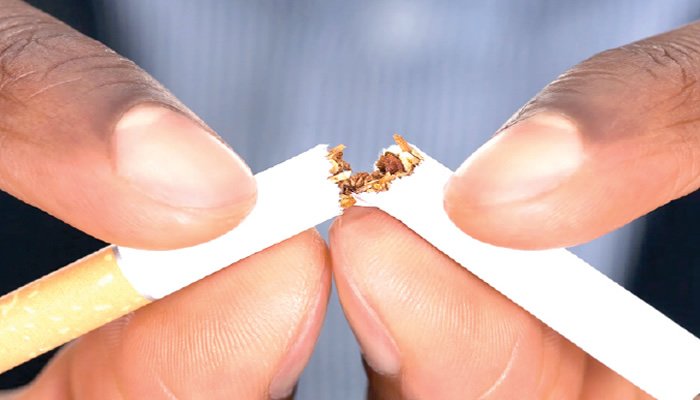Before 2021, the cautionary advice on cigarette packs in Nigeria was “The Federal Ministry of Health warns that smokers are liable to die young.”
Yet, this did not deter Useni Musa, a resident of the Federal Captial Territory (Abuja), in Northcentral Nigeria, from trying out his first cigarette stick at 13.
By the age of 19, he had become addicted, smoking an average of two packs a day.
Useni is a butcher who sells meat kebabs in Dakwo, an informal settlement in Abuja. He says that the charcoal he uses to grill the meat made it easy for him to always light a cigarette.
“I smoked for about two decades,” he says.
“I lived my entire life in a slum where I saw different people smoke cigarettes and other substances and I admired their lifestyle. I started smoking by picking up cigarette butts or sharing sticks with others. By the time, I started making money, I began buying my packs”, he continues.
Now 35 years old with wives and children, Useni explains that he quit smoking to live a healthy life and serve as a good example in society.
He realized that smoking offended people because of its strong smell and he quit in 2021.
“In our society, smoking is seen as bad and smokers are sometimes considered to be drug addicts,” he says.
But he warns that “Stopping was not easy. You have to make the decision by yourself and stick to it.”
In the case of Abubakar Umar, a scrap dealer and tea seller from Kastina State, he got hooked on smoking at the age of 15.
Abubakar knew about the health implications of smoking and disliked the smell, yet started anyway in 2008. He started the habit because his friends smoked and he wanted to be “cool” like them.
“I am not educated, but you can tell it is not healthy to smoke from the warnings and pictures on the packs of cigarettes.
I got influenced by watching and admiring people who smoke. I did not enjoy it at first, but I continued and started smoking about 7 to 10 cigarettes a day. Initially, I thought it helped by soothing me when I got angry or depressed but it was not the case,” he explains.
Abubakar decided to quit after 15 years of smoking. “I realized there was no gain in smoking and decided it was time to stop.”
“No one advised me to quit. I think people can choose what’s best for themselves. One day, I tried smoking and after three puffs, I put it out and stopped,” he recounts. He encourages anyone who wants to quit to be determined even if they relapse.
Putting a stop to tobacco
The World Health Organization (WHO) states that tobacco consumption is one of the major public health threats the world is facing.
In Africa, every year, 146 000 people die from tobacco-related diseases including cancer, heart disease, stroke, lung diseases, and chronic obstructive pulmonary disease, among others.
Unlike Musa and Abubakar, many people are addicted to tobacco but have not been able to quit.
“Tobacco use is a damaging habit that must be avoided because it can introduce a wide range of diseases to the body and has similar damaging effects on those exposed to the smoke,” says Dr Francis Fagbuile, a public health expert with the University College Teaching Hospital in Ibadan, Oyo State.
Dr Fagbuile explains that “All forms of tobacco are harmful, and there is no safe level of exposure.
“Tobacco has about 7000 chemicals in it and 40 of them cause cancer. When smokers use tobacco, it causes danger to all parts of the body – oral cancer, lung cancer oral gum diseases, and also affects the brain. It is also associated with hypertension and diabetes,” he says.
Every year, on 31 May, WHO and public health champions around the world come together to mark World No Tobacco Day. The day is used to raise awareness of the negative health, social, economic, and environmental impacts of tobacco production and use
The theme for this year’s commemoration is “We need food, not tobacco.” Emphasizing the importance of the theme, Dr Fagbuile explains that the cultivation of tobacco is harmful to the environment, hazardous to the farmers, and increases the risk of food insecurity.
“To stop the cultivation of tobacco, the government should encourage farmers to plant alternative farm produce that would be beneficial by providing them with incentives,” he says.
Furthermore, WHO Representative in Nigeria, Dr Walter Kazadi Mulombo, calls on the governments and policymakers to provide an enabling environment for tobacco farmers to shift to growing alternative food crops.
He explains that compared with other agricultural activities such as maize growing and grazing livestock, tobacco farming has a far more destructive impact on ecosystems as tobacco farmlands are more prone to desertification.
“Across the world, an estimated 3.5 million hectares of land are used for tobacco growing each year.
Nine of the 10 largest tobacco cultivators are low- and middle-income countries and four of these are defined as low-income food-deficit countries,” he says.
Tobacco regulation efforts
To curb the harmful use of tobacco, WHO is supporting the Government of Nigeria to formulate and implement policies that would regulate the use of the deadly product.
These include strengthening the National Tobacco Control Committee and conducting several sensitization and capacity-building activities for different stakeholders, including on new and emerging tobacco products.
In addition, WHO, Centre for Disease Control (CDC), CDC Foundation, Research Triangle Insitute (RTI), and other stakeholders are supporting the country to conduct the Global Adult Tobacco Survey.
The survey will provide recent data on tobacco.
WHO supported the Federal Ministry of Health to develop and produce Graphic Health Warnings (GHWs) as stipulated by the 2015 National Tobacco Control Act and its regulation. Since 2021, a combination of GHWs and text health warnings covering at least 50% on the package is being implemented. This will increase to 60% by 2024.








